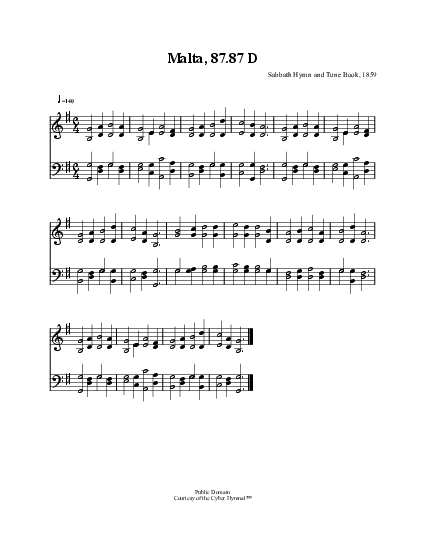- |
User Links
Peace Be To This Habitation

Peace be to this habitation
Author: Charles WesleyPublished in 40 hymnals
Printable scores: PDF, Noteworthy ComposerAudio files: MIDI
Representative Text
1 Peace be to this habitation,
Peace to all who dwell therein,
Peace, the earnest of salvation
Peace, the fruit of pardoned sin.
2 Peace that speaks its heav'nly Giver,
Peace to worldly minds unknown,
Peace divine, that lasts forever,
Peace that comes from God alone.
3 Jesus, Prince of peace, be near us,
Fix in all our hearts Thy home:
With Thy gracious presence cheer us,
Let Thy sacred kingdom come.
4 Raise to heav'n our expectation,
Give our favored souls to prove
Glorious and complete salvation,
In the realms of bliss above.
Amen.
Source: American Lutheran Hymnal #263
Author: Charles Wesley
 Charles Wesley, M.A. was the great hymn-writer of the Wesley family, perhaps, taking quantity and quality into consideration, the great hymn-writer of all ages. Charles Wesley was the youngest son and 18th child of Samuel and Susanna Wesley, and was born at Epworth Rectory, Dec. 18, 1707. In 1716 he went to Westminster School, being provided with a home and board by his elder brother Samuel, then usher at the school, until 1721, when he was elected King's Scholar, and as such received his board and education free. In 1726 Charles Wesley was elected to a Westminster studentship at Christ Church, Oxford, where he took his degree in 1729, and became a college tutor. In the early part of the same year his religious impressions were much deepene… Go to person page >
Charles Wesley, M.A. was the great hymn-writer of the Wesley family, perhaps, taking quantity and quality into consideration, the great hymn-writer of all ages. Charles Wesley was the youngest son and 18th child of Samuel and Susanna Wesley, and was born at Epworth Rectory, Dec. 18, 1707. In 1716 he went to Westminster School, being provided with a home and board by his elder brother Samuel, then usher at the school, until 1721, when he was elected King's Scholar, and as such received his board and education free. In 1726 Charles Wesley was elected to a Westminster studentship at Christ Church, Oxford, where he took his degree in 1729, and became a college tutor. In the early part of the same year his religious impressions were much deepene… Go to person page >Text Information
| First Line: | Peace be to this habitation |
| Title: | Peace Be To This Habitation |
| Author: | Charles Wesley |
| Meter: | 8.7.8.7 D |
| Language: | English |
| Copyright: | Public Domain |
Notes
Peace be to this habitation. C. Wesley. [Household Peace desired.] This is No. 35 of his "Hymns for Believers,” which appeared in Hymns & Sacred Poems, 1749, vol. ii., in 6 stanzas of 8 1ines, and headed "On entering an House." (P. Works, 1868-72, vol. v. p. 53.) It is not in common use in its full form, but as follows:—
1. Peace be to this habitation. This, as given in Cotterill's Selections, 1819, No. 336, was composed of st. i., ii. from this hymn (st. i. and vi.) altered, and st. iii. from J. Newton ("May the grace of Christ our Saviour"). This text, with slight changes, and the omission of the stanza from J. Newton, was handed down to modern hymn-books through Montgomery's Christian Psalmist, 1825; Conder's Congregational Hymn Book, 1836; the Baptist Psalms & Hymns, 1858, and others. The doxology in W. F. Stevenson's Hymns for Church and Home, 1873, is Conder's "Praise the God of all creation," which appeared in the Congregational Hymn Book, 1836, No. 552. It gives a stately finish to the hymn.
2. Peace be to this sacred dwelling. This, in the American Sabbath Hymn Book, 1858, and others, is Cotterill's st. i., ii., as altered in Montgomery's Christian Psalmist, 1825, again slightly altered to adapt it the better for Public Worship.
3. Peace be to this congregation. This is No. 2 with further changes. It is No. 25 in the American Unitarian Hymns of the Spirit, 1864. The alteration of the first line is found in some of the earliest editions of the Lady Huntingdon Collection.
As these forms of the text are in extensive use, and as they differ somewhat widely from Wesley, we append sts. i. and vi. of his original:—
"Peace be to this habitation!
Peace to every soul herein!
Peace, the foretaste of salvation,
Peace, the seal of cancell'd sin,
Peace that speaks its heavenly Giver,
Peace to earthly minds unknown,
Peace Divine, that lasts for ever,
Here erect its glorious throne!
. . . . . . . . . . . . . . . . . . . . . . . . .
"Prince of peace, if Thou art near us,
Fix in all our hearts Thy home,
By Thy last appearing cheer us,
Quickly let Thy kingdom come:
Answer all our expectation,
Give our raptured souls to prove
Glorious, uttermost salvation,
Heavenly, everlasting love!"
4. Visit, Lord, this habitation. In the Philadelphia Selection of Hymns, 1861, this is composed of Wesley's st. i., 11. 1-4; st. iii., 11. 1-4; and st. vi. slightly altered.
--John Julian, Dictionary of Hymnology (1907)
Tune
MALTA (12321)AUTUMN (Barthélemon)
This tune is adapted from Barthélemon's piece Durandarte and Belerma: A Pathetic Scotch Ballad (1797). Some editors describe AUTUMN as "adapted from Psalm xlii in the Genevan Psalter, 1551", referring to the similarity between this tune and FREU DICH SEHR.
TRUST (Mendelssohn-Bartholdy)


 My Starred Hymns
My Starred Hymns



